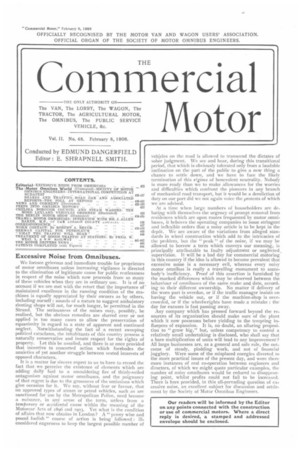Excessive Noise from Omnibuses.
Page 1

If you've noticed an error in this article please click here to report it so we can fix it.
We foresee grievous and immediate trouble for proprietors of motor omnibuses unless increasing vigilance is directed to the elimination of legitimate cause for public restlessness in respect of the noise which now proceeds from so many of these vehicles when they are in ordinary use. It is of no account if we are met with the retort that the importance of maintained excellence in the running condition of the machines is equally appreciated by their owners as by others, including ourself : sounds of a nature to suggest ambulatory riveting shops will not, for much longer, be permitted in the Strand. The seriousness of the noises may, possibly, be realised, but the obvious remedies are slurred over or not applied in too many cases to allow the preservation of equanimity in regard to a state of apparent and continued neglect. Notwithstanding the fact of a recent sweeping political cataclasm, the inhabitants of this country possess a naturally conservative and innate respect for the rights of property. Let this be assailed, and there is at once provided that incentive to concerted action which forebodes the anxieties of yet another struggle between vested interests of opposed characters.
It is a matter for sincere regret to us to have to record the fact that we perceive the existence of elements which are adding daily fuel to a smouldering fire of thinly-veiled antagonism against motor omnibuses, and the poignancy of that regret is due to the grossness of the omissions which give occasion for it. We say, without fear or favour, that no approved types of steam or petrol vehicles, such as are sanctioned for use by the Metropolitan Police, need become IL nuisance, in any sense of the term, unless from a temporary or accidental cause within the meaning of the Motorcar Acts of 1896 and 1903. Yet what is the condition of affairs that now obtains in London? A "penny wise and pound foolish " course of action is being followed :
considered eagerness to keep the largest possible number of
vehicles on the road is allowed to transcend the dictates of sober judgment. We see and hear, during this transitional period, that which is obviously tolerated only from a laudable inclination on the part of the public to give a new thing a chance to settle down, and we have to face the likely • termination of this regime of benevolent neutrality. Nobody is more ready than we to make allowances for the worries and difficulties which confront the pioneers in any branch of mechanical road transport, but it would be a dereliction of duty on our part did we not again voice the protests of which we are advised.
At a time when large numbers of householders are debating with themselves the urgency of prompt removal from residences which are upon routes frequented by motor omnibuses, it behoves the operating companies to issue stringent and inflexible orders that a noisy article is to be kept in the depot. We are aware of the variations from alleged standards in wheel construction which add to the intricacies of the problem, but the " peak " of the noise, if we may be allowed to borrow a term which conveys our meaning, is principally attributable to faulty adjustment or neglected, supervision. it will be a bad day for commercial motoring in this country if the idea is allowed to become prevalent that excessive noise is a necessary evil, whereas every noisy motor omnibus is really a travelling monument to somebody's inefficiency. Proof of this assertion is furnished by the marked differences which may be observed between the behaviour of omnibuses of the same make and date, according to their different ownership. No matter if delivery of the worn part is overdue, or if the traffic manager insists on having the vehicle out, or if the machine-shop is overcrowded, or if the wheelwrights have made a mistake : the day for excuses is fast passing away.
Any company which has pressed forward beyond the resources of its organisation should make sure of the plant which it now possesses before yielding to the tempting influences of expansion. It is, no doubt, an alluring proposition to "grow big," but, unless competency to control a relatively small undertaking is disclosed, who shall say that a bare multiplication of units will lead to any improvement? All large businesses are, as a general and safe rule, the outcome of steady, plodding work, and not of financial jugglery. Were some of the misplaced energies diverted, to the more practical issues of the present day, and were there more instances of real co-operation between engineers and directors, of which we might quote particular examples, the number of noisy omnibuses would be reduced to disappearing point, whilst profits could not fail to be increased. There is here provided, in this all-pervading question of excessive noise, an excellent subject for discussion and settlemeta by the Society of Motor Omnibus Engineers.




















